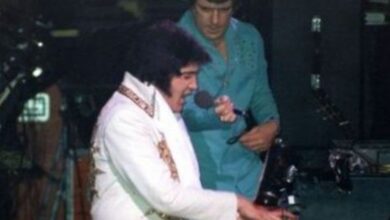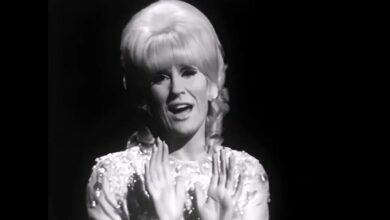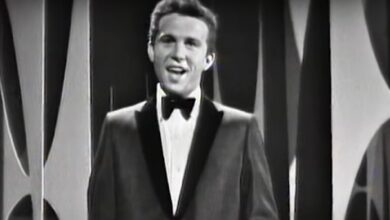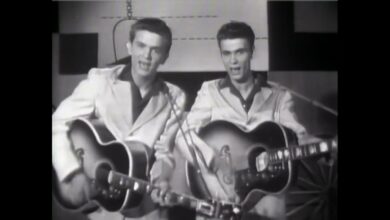Fats Domino’s ‘Blueberry Hill’: The 1956 Hit That Defined Rock and Roll’s Golden Era
In 1956, Fats Domino released his rendition of “Blueberry Hill,” a song that would become one of his most iconic hits and a staple in the rock and roll genre. Originally composed in 1940 by Vincent Rose with lyrics by Larry Stock and Al Lewis, the song had been recorded by various artists before Domino’s version brought it to unprecedented popularity. His smooth vocals and distinctive piano style infused the track with a unique charm that resonated with a wide audience.
The origins of “Blueberry Hill” trace back to its initial recordings in 1940. That year, several artists, including Glenn Miller and his Orchestra, recorded the song, with Miller’s version reaching number two on the Billboard pop singles chart. Despite these early successes, it was Fats Domino’s 1956 rendition that transformed “Blueberry Hill” into a rock and roll classic, showcasing his ability to reinterpret existing songs with his signature New Orleans flair.
Domino’s recording session for “Blueberry Hill” took place in Los Angeles. Interestingly, he initially struggled to find the right tempo and feel for the song. However, once he settled into a groove that suited his style, the result was a captivating performance that highlighted his mellow voice and rhythmic piano accompaniment. This approach gave the song a laid-back yet compelling quality that distinguished it from earlier versions.
Upon its release, Domino’s “Blueberry Hill” achieved remarkable commercial success. The song reached number two on the Billboard Top 40 charts, maintaining that position for three weeks, and spent eight non-consecutive weeks at number one on the R&B Best Sellers chart. This achievement marked it as his biggest pop hit and underscored its widespread appeal across different audience demographics.
The song’s success was not limited to the United States; it also gained international acclaim. In the United Kingdom, “Blueberry Hill” became a favorite among listeners, contributing to Domino’s growing global reputation. The track’s universal themes of love and longing, combined with its catchy melody, allowed it to transcend cultural boundaries and resonate with audiences worldwide.
“Blueberry Hill” played a significant role in cementing Fats Domino’s status as a leading figure in the rock and roll movement. His ability to blend rhythm and blues with mainstream pop elements broadened the genre’s appeal and paved the way for future artists. Domino’s approachable demeanor and consistent musicality endeared him to fans and made him a beloved figure in the music industry.
The song’s influence extended beyond its initial chart success. It became a cultural touchstone, featured in various films, television shows, and commercials over the decades. Its enduring popularity is a testament to its timeless appeal and the emotive power of Domino’s performance. The song’s simple yet profound lyrics about lost love and cherished memories continue to strike a chord with listeners.
“Blueberry Hill” has been covered by numerous artists across different genres, each bringing their unique interpretation to the classic. Notable renditions include those by Elvis Presley, Little Richard, and Led Zeppelin, demonstrating the song’s versatility and enduring influence. These covers have introduced the song to new generations, ensuring its place in the annals of music history.
The song’s legacy is further evidenced by its accolades. In 2005, “Blueberry Hill” was inducted into the Grammy Hall of Fame, recognizing its lasting significance in the recording industry. Additionally, Rolling Stone magazine ranked it number 82 on its list of the 500 Greatest Songs of All Time, highlighting its impact on popular music.
Fats Domino’s performance of “Blueberry Hill” also had a significant impact on his live shows. The song became a staple in his concerts, often eliciting enthusiastic responses from audiences. Its upbeat tempo and singable melody made it a crowd favorite, and Domino’s charismatic delivery further enhanced its appeal during live performances.
The song’s association with Domino also contributed to the popularization of New Orleans rhythm and blues. His rendition showcased the rich musical heritage of the city, characterized by its distinctive rhythms and melodic structures. This exposure helped bring New Orleans music to a broader audience and influenced subsequent musical developments.
Reflecting on the song’s creation, it’s noteworthy that Domino was initially hesitant to record “Blueberry Hill,” believing it was too traditional for his style. However, his producer, Dave Bartholomew, convinced him to give it a try, resulting in one of the most successful collaborations in music history. This decision underscores the importance of artistic experimentation and openness to new ideas in the creative process.
The song’s enduring popularity has also led to its use in various cultural contexts. For instance, it was featured in the television show “Happy Days” as the favorite song of the character Richie Cunningham, played by Ron Howard. This association further cemented its place in American pop culture and introduced it to a new generation of viewers.
In addition to its cultural impact, “Blueberry Hill” has been the subject of academic analyses exploring its musical structure and lyrical themes. Scholars have noted its blend of blues and pop elements, as well as its narrative of nostalgic longing, as key factors in its enduring appeal. These studies highlight the song’s complexity and its significance in the broader context of music history.
Today, “Blueberry Hill” remains a beloved classic, regularly played on oldies radio stations and featured in various media. Its timeless melody and heartfelt lyrics continue to resonate with listeners, ensuring its place as a cornerstone of American music. Fats Domino’s rendition stands as a testament to his talent and the enduring power of a well-crafted song.
In summary, “Blueberry Hill” is more than just a song; it’s a cultural artifact that encapsulates a significant era in music history. Fats Domino’s 1956 rendition transformed a standard tune into a rock and roll masterpiece, leaving an indelible mark on the musical landscape. Its enduring popularity serves as



